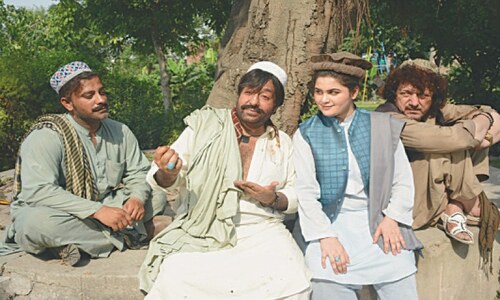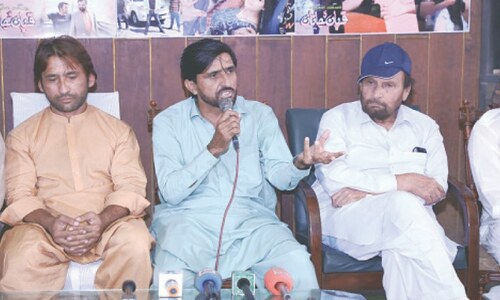PESHAWAR: Despite deep decline in cinema culture, film producers and investors take courage to screen Pashto movies today, the first day of Eidul Fitr, to carry on the legacy of entertaining the cine goers on silver screen.
Three new Pashto movies namely Zoye Da Azari, Hashnaghar Kay Malangi Pekhawar Kay Badmashee and Deedan are being screened though most cinema houses in the city have been razed to the ground in the backdrop of its poor business.
Film stars Shahid Khan, Jahangir Jani and Arbaz Khan are appearing in the Eid releases while film directors including Shahid Usman, Qaisar Sanubar and Arshad Khan are in the run for earning more business. Heroines namely Bisma Chohan, Jiya Butt, Reena Multani and Naleem Gul are also displaying their talent in the Eid flicks.
The trio of Eid releases are characterised by powerful music tracks and entrainment as the promos of the Pashto movies released online prior to Eid received huge response from audience. Filmmakers and directors said that movies failed to get success at box office. They added that Eid was the only occasion where cine goers got attention of the big screen and turn up in a large number.
Social media onslaught has affected the industry
Investors make tall claims of earning more business owing to quality production in line with modern digital demands of cinematography, storyline and music quality. Pashto cinema, also known as Pollywood, has a rich cultural heritage that reflects the traditions, values and history of Pashtuns.
With a history spanning over six decades, Pashto cinema has evolved into a unique and vibrant industry that showcases the beauty and diversity of Pashtun culture. The first Pashto film “Laila Majnu” was released in 1941. However, it was not until the 1950s and 1960s that Pashto cinema began to flourish. During this period, films like “Aalam Tangan” and “Zama Jora” became huge hits, establishing Pashto cinema as a major player in Pakistani film industry.
The 1970s and 1980s are considered the golden era of Pashto cinema. This period saw the rise of legendary actors like Badar Munir, Asif Khan and Yasmin Khan. Films like “Orbal” and “Gul Bakawli” became classics and the industry experienced a surge in popularity.
In recent years, Pashto cinema has undergone a significant transformation. The industry has seen the emergence of new talent and films like “Zakhmoona” and “Bazigar” have achieved critical and commercial success. The use of modern technology and innovative storytelling has helped Pashto cinema to stay relevant and fresh.
Pashto cinema plays a vital role in promoting Pashtun culture and values. The industry provides a platform for artists to express themselves and showcase their talent. Pashto films often focus on themes like love, honour and traditions.
Despite its rich cultural heritage, Pashto cinema faces several challenges. The industry has struggled with funding and lack of infrastructure has hindered its growth. Additionally, the rise of social media onslaught and Western cinema has posed a significant threat to the industry.
Despite facing several challenges, the industry remains a source of pride for Pashtuns and its legacy continues to inspire new generations of artists and filmmakers.
Published in Dawn, March 31st, 2025
















































